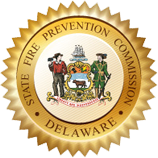
DOVER – The Delaware Division of Public Health (DPH) is advising Delawareans of a multi-state outbreak of Listeria infections linked to deli ham. Several companies have recalled ham products that could be contaminated with Listeria monocytogenes bacteria and could make people sick. To date, there have been no confirmed cases reported in Delaware, but DPH urges consumers to take precautions to prevent illness. Listeria is particularly harmful to pregnant women.
According to the Centers for Disease Control and Prevention (CDC), four people infected with the outbreak strain of Listeria monocytogenes have been reported in North Carolina and Virginia. All four had been hospitalized and one death was reported by Virginia health officials.
Johnston County Hams, Inc. recalled the following ready-to-eat ham products:
• Johnston County Hams, Inc. Country Style Fully Cooked Boneless Deli Ham
• Ole Fashioned Sugar Cured The Old Dominion Brand Hams Premium Fully Cooked Country Ham with sell-by dates from April 10, 2018, to September, 27 2019
• Padow’s Hams & Deli, Inc. Fully Cooked Country Ham Boneless Glazed with Brown Sugar
• Premium Fully Cooked Country Ham Less Salt Distributed by Valley Country Hams, LLC. with sell-by dates from April 10, 2018, to September 27, 2019
• Goodnight Brothers Country Ham Boneless Fully Cooked
The recalled ham products were produced from April 3, 2017, through October 2, 2018. In addition, the recalled products are labeled with establishment number “EST. M2646” inside the USDA mark of inspection.
Ladyfingers Gourmet to Go recalled the following ready-to-eat ham rolls:
• Signature Shaved Country Ham Rolls. The rolls are made with ham produced by Johnston County Hams and bear the UPC: 8 56149 00509 9.
Consumers who have any of these recalled products at home should not eat them, even if some of it was consumed and no one has gotten sick. If you do not know if the product has been recalled, do not eat it. Before purchasing deli ham at a grocery store or eating it at a restaurant, consumers should confirm with the store or restaurant that it is not one of the recalled products.
Restaurants and retailers should not serve or sell any of the recalled products. Retailers should also clean and sanitize deli slicers and other areas where recalled deli ham was prepared, stored or served. Follow the manufacturer’s recommendations for sanitizer strength and application to ensure it is effective. For more information, visit: https://www.fsis.usda.gov/wps/portal/fsis/topics/regulatory-compliance/compliance-guides-index/controlling-lm-retail-delicatessens.
If you believe you might have a recalled product, return it to the store for a refund or throw it away. If you do not know if the ham you purchased was recalled, ask the business where you purchased it or throw it away. If you have questions, contact the DPH Office of Infectious Disease Epidemiology at 302-744-4990 or 24/7 at 888-295-5156.
People with invasive listeriosis usually report symptoms starting one to four weeks after eating food contaminated with Listeria. Pregnant women and their newborns, adults age 65 and older, and people with weakened immune systems are more likely to get sick with listeriosis. The symptoms differ for pregnant women compared to non-pregnant individuals:
Women who are or may be pregnant: Pregnant women typically experience only fever and other flu-like symptoms, such as fatigue and muscle aches. However, infections during pregnancy can lead to miscarriage, stillbirth, premature delivery or life-threatening infection of the newborn.
People other than pregnant women: Symptoms can include headache, stiff neck, confusion, loss of balance and convulsions, in addition to fever and muscle aches.
Anyone who experiences these symptoms should seek emergency medical care immediately. Medical providers should report suspected cases of Listeria to the DPH Office of Infectious Disease Epidemiology at 302-744-4990 or 24/7 at 888-295-5156.
For more information regarding the outbreak, visit: https://www.cdc.gov/listeria/outbreaks/countryham-10-18/index.html. For more information regarding the food recalls, visit https://www.fsis.usda.gov/wps/portal/fsis/topics/recalls-and-public-health-alerts/recall-case-archive/archive/2018/recall-084-2018-release or https://www.fda.gov/Safety/Recalls/ucm622719.htm. For additional information on Listeria infection, visit https://www.cdc.gov/listeria/index.html.
DPH Also Advises Residents of Multi-State Salmonella Outbreak Linked to Raw Chicken Products
DPH is also taking this time to make Delaware residents aware of a multi-state outbreak of multidrug-resistant Salmonella Infantis infections linked to raw chicken products. According to the CDC, 92 people infected with the outbreak strain of Salmonella Infantis have been reported in 29 states, including two cases in Delaware. Of the cases reported nationally, 22 people have been hospitalized (including two Delawareans). No deaths have been reported.
The CDC says the outbreak strain has been found in samples taken from raw chicken pet food, raw chicken products, and live chickens, and is resistant to multiple antibiotics, including first-line treatment options. This means if antibiotics are needed for severe infections, alternative or second-line treatments may need to be used. Advice to clinicians can be found here: https://www.cdc.gov/salmonella/infantis-10-18/advice.html.
A single, common supplier of chicken has not been identified. There is no need for consumers to avoid eating properly cooked chicken, and retailers are not being advised to stop selling raw chicken products. However, individuals should follow these steps to help prevent Salmonella infection from raw chicken:
• Always handle raw chicken carefully and cook it thoroughly to prevent food poisoning. This outbreak is a reminder that raw chicken can have germs that spread around food preparation areas and make you sick.
• Wash your hands. Salmonella infections can spread from one person to another if hands have Salmonella germs on them. Wash hands before and after preparing or eating food, after contact with animals, and after using the restroom or changing diapers.
• Cook raw chicken thoroughly to kill harmful germs. Chicken breasts, whole chickens, and ground poultry, including chicken burgers and chicken sausage, should always be cooked to an internal temperature of 165°F to kill harmful germs. Leftovers should be reheated to 165°F. Use a food thermometer to check and place it in the thickest part of the food.
• Don’t spread germs from raw chicken around food preparation areas. Washing raw poultry before cooking is not recommended. Germs in raw chicken can spread to other foods and kitchen surfaces. Thoroughly wash hands, counters, cutting boards and utensils with warm, soapy water after they touch raw chicken. Use two separate cutting boards for raw chicken, meats and seafood; and the other for fruits and vegetables. Wash boards completely with soap and warm water between each use to kill germs.
• CDC does not recommend feeding raw diets to pets (https://www.cdc.gov/healthypets/publications/pet-food-safety.html). Germs like Salmonella in raw pet food can make your pets sick. Your family also can get sick by handling the raw food or by taking care of your pet.
For more information about this outbreak, visit https://www.cdc.gov/salmonella/infantis-10-18/index.html. For more information about preventing Salmonella infection, visit https://www.cdc.gov/salmonella/general/prevention.html.
A person who is deaf, hard-of-hearing, deaf-blind or speech-disabled can call the DPH phone number above by using TTY services. Dial 7-1-1 or 800-232-5460 to type your conversation to a relay operator, who reads your conversation to a hearing person at DPH. The relay operator types the hearing person’s spoken words back to the TTY user. To learn more about TTY availability in Delaware, visit http://delawarerelay.com.
Delaware Health and Social Services is committed to improving the quality of the lives of Delaware’s citizens by promoting health and well-being, fostering self-sufficiency, and protecting vulnerable populations. DPH, a division of DHSS, urges Delawareans to make healthier choices with the 5-2-1 Almost None campaign: eat 5 or more fruits and vegetables each day, have no more than 2 hours of recreational screen time each day (includes TV, computer, gaming), get 1 or more hours of physical activity each day, and drink almost no sugary beverages.





















































































